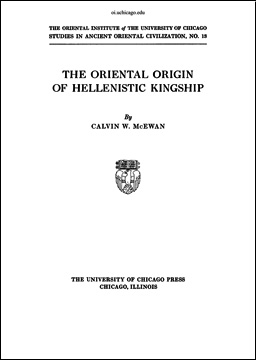SAOC 13. The Oriental Origin of Hellenistic Kingship Calvin W. McEwan

This is a careful and documented survey of the prehistoric evolution of kingship as an institution, the forms it assumes in the ancient world, and eventually in Hellenistic culture. The author claims to demonstrate that "the recurrence of this institution in the sophisticated culture of the Hellenistic world was a conscious adoption from the East of a convenient political form. No one doubts the widespread observance of "divine kingships" in Egypt, Mesopotamia, and other regions of the Near East. The question, however, had been long debated, whether the honors paid to, and the status claimed by, Alexander and his successors, was of precisely, or even generically, of the same kind. The crucial instances would seem to be Egypt, where Alexander first exhibited inclination toward this view of his own monarchy, and Persia, where McEwan produces some little-known evidence, and rightly emphasizes Gow's point that "Aeschylus and his audience knew a great deal more about Persia and the Persians than we are ever likely to know." [From a review by J. L. Myres in the Journal of Egyptian Archaeology 22 (1937) 122]
- Studies in Ancient Oriental Civilization 13
- Chicago: The University of Chicago Press, 1934
- Pp. xii + 34
- 7.00 x 9.50 in.
- Out of Print

